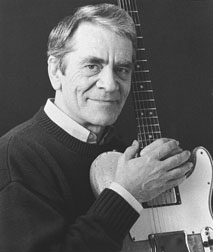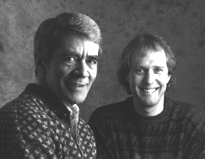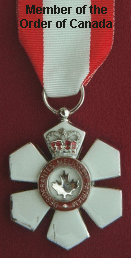About Ed
 Ed Bickert was born in
Hochfeld, Manitoba on November 29th, 1932,
and raised in
Vernon, British Columbia. His early interest in guitar was
in part influenced by his musical household (his mother and father played
piano and guitar in country bands). He was self-taught, developing an
interest in jazz harmony by studying and analyzing
Stan Kenton
records. Via radio broadcasts from the American West Coast, he heard and was
influenced by
Nat "King" Cole Trio guitarist Oscar Moore,
Barney Kessel and
Les Paul. In his early teens he gained
experience by playing onstage with his parents.
Ed Bickert was born in
Hochfeld, Manitoba on November 29th, 1932,
and raised in
Vernon, British Columbia. His early interest in guitar was
in part influenced by his musical household (his mother and father played
piano and guitar in country bands). He was self-taught, developing an
interest in jazz harmony by studying and analyzing
Stan Kenton
records. Via radio broadcasts from the American West Coast, he heard and was
influenced by
Nat "King" Cole Trio guitarist Oscar Moore,
Barney Kessel and
Les Paul. In his early teens he gained
experience by playing onstage with his parents.
 In 1952 Ed moved to
Toronto, working as a radio station engineer and playing
after-hours jazz clubs on the side. Shy and retiring, he was slow to work
himself into the Toronto jazz circuit, but by 1955 he was a regular club
performer -- and in 1957, he made his first studio recording date, appearing
on
Moe Koffman's fluke hit single Swinging Shepherd Blues.
In 1952 Ed moved to
Toronto, working as a radio station engineer and playing
after-hours jazz clubs on the side. Shy and retiring, he was slow to work
himself into the Toronto jazz circuit, but by 1955 he was a regular club
performer -- and in 1957, he made his first studio recording date, appearing
on
Moe Koffman's fluke hit single Swinging Shepherd Blues.
 In the 60s, Ed worked regularly with Koffman and other major figures of Canadian
jazz. He was invited to be a founding member of
Rob McConnell's Boss Brass
in 1968 and has played with that unit ever since, as well as becoming increasingly
in demand as a session guitarist.
In the 60s, Ed worked regularly with Koffman and other major figures of Canadian
jazz. He was invited to be a founding member of
Rob McConnell's Boss Brass
in 1968 and has played with that unit ever since, as well as becoming increasingly
in demand as a session guitarist.
 In 1974, on the recommendation of the legendary
Jim Hall, the equally legendary
Paul Desmond sought out Ed to form a performing quartet,
marking Desmond's return to the musical stage after an absence of seven years.
Desmond, a jazz star who had seen the world and played with the best, was
utterly blown away by Ed's playing, and determined to record with him; this
marked Ed's first session for an American label, with consequent wider exposure.
During the next three years [Desmond's last], the Desmond-Bickert quartet
performed frequently, and many of these gigs were recorded. (Lucky for us!
Paul and Ed brought out the best in each other, and their records together
constitute a high-water mark in jazz.)
In 1974, on the recommendation of the legendary
Jim Hall, the equally legendary
Paul Desmond sought out Ed to form a performing quartet,
marking Desmond's return to the musical stage after an absence of seven years.
Desmond, a jazz star who had seen the world and played with the best, was
utterly blown away by Ed's playing, and determined to record with him; this
marked Ed's first session for an American label, with consequent wider exposure.
During the next three years [Desmond's last], the Desmond-Bickert quartet
performed frequently, and many of these gigs were recorded. (Lucky for us!
Paul and Ed brought out the best in each other, and their records together
constitute a high-water mark in jazz.)
In 1979, Ed recorded a duo album with his fellow Desmond Quartet alumnus
Don Thompson -- the album won the 1980
Juno Award for
Best Jazz Recording of the Year.

 In the 80s, Ed continued to work regularly with Koffman and McConnell.
Furthermore,
he signed with
Concord Jazz Records, which meant even greater exposure
in the States. For Concord, he frequently backed up
Rosemary Clooney, toured with the Concord Jazz All-Stars, and
[finally] began to record as a session leader on a regular basis.
In the 80s, Ed continued to work regularly with Koffman and McConnell.
Furthermore,
he signed with
Concord Jazz Records, which meant even greater exposure
in the States. For Concord, he frequently backed up
Rosemary Clooney, toured with the Concord Jazz All-Stars, and
[finally] began to record as a session leader on a regular basis.
In 1983, Ed also became co-leader of a dual-guitar quartet with
Lorne Lofsky, an arrangement that lasted a full ten years.

Back to the Ed Bickert home page!
 In 1952 Ed moved to
Toronto, working as a radio station engineer and playing
after-hours jazz clubs on the side. Shy and retiring, he was slow to work
himself into the Toronto jazz circuit, but by 1955 he was a regular club
performer -- and in 1957, he made his first studio recording date, appearing
on
Moe Koffman's fluke hit single Swinging Shepherd Blues.
In 1952 Ed moved to
Toronto, working as a radio station engineer and playing
after-hours jazz clubs on the side. Shy and retiring, he was slow to work
himself into the Toronto jazz circuit, but by 1955 he was a regular club
performer -- and in 1957, he made his first studio recording date, appearing
on
Moe Koffman's fluke hit single Swinging Shepherd Blues. Ed Bickert was born in
Hochfeld, Manitoba on November 29th, 1932,
and raised in
Vernon, British Columbia. His early interest in guitar was
in part influenced by his musical household (his mother and father played
piano and guitar in country bands). He was self-taught, developing an
interest in jazz harmony by studying and analyzing
Stan Kenton
records. Via radio broadcasts from the American West Coast, he heard and was
influenced by
Nat "King" Cole Trio guitarist Oscar Moore,
Barney Kessel and
Les Paul. In his early teens he gained
experience by playing onstage with his parents.
Ed Bickert was born in
Hochfeld, Manitoba on November 29th, 1932,
and raised in
Vernon, British Columbia. His early interest in guitar was
in part influenced by his musical household (his mother and father played
piano and guitar in country bands). He was self-taught, developing an
interest in jazz harmony by studying and analyzing
Stan Kenton
records. Via radio broadcasts from the American West Coast, he heard and was
influenced by
Nat "King" Cole Trio guitarist Oscar Moore,
Barney Kessel and
Les Paul. In his early teens he gained
experience by playing onstage with his parents. In the 80s, Ed continued to work regularly with Koffman and McConnell.
Furthermore,
he signed with
In the 80s, Ed continued to work regularly with Koffman and McConnell.
Furthermore,
he signed with

